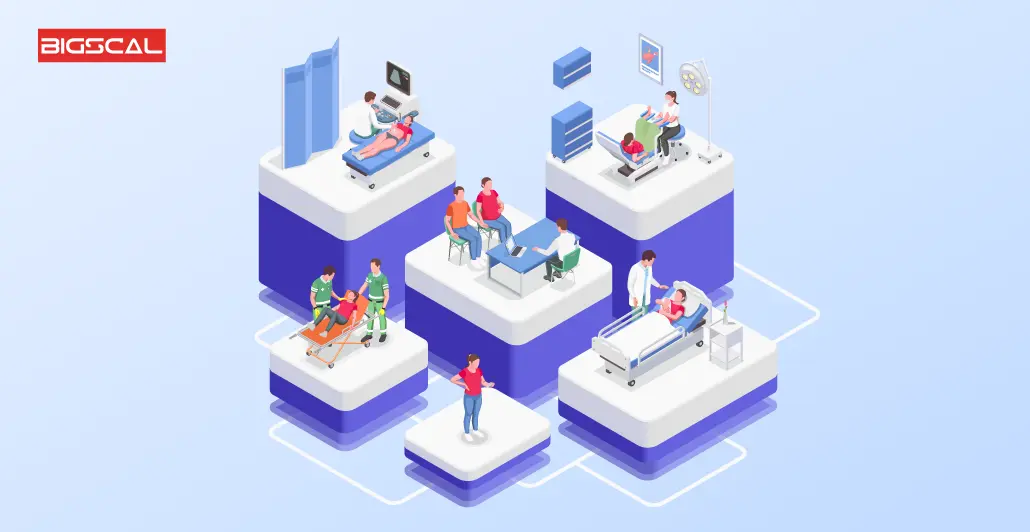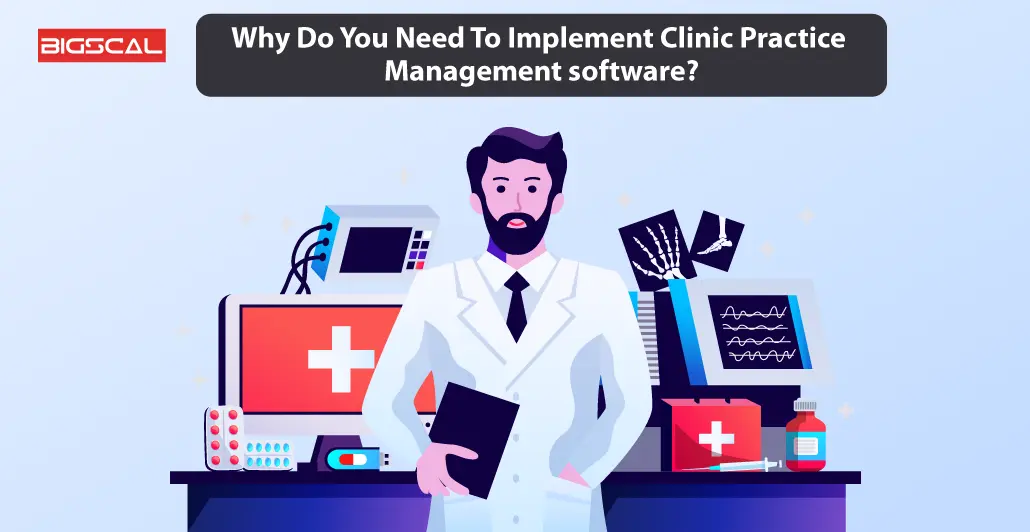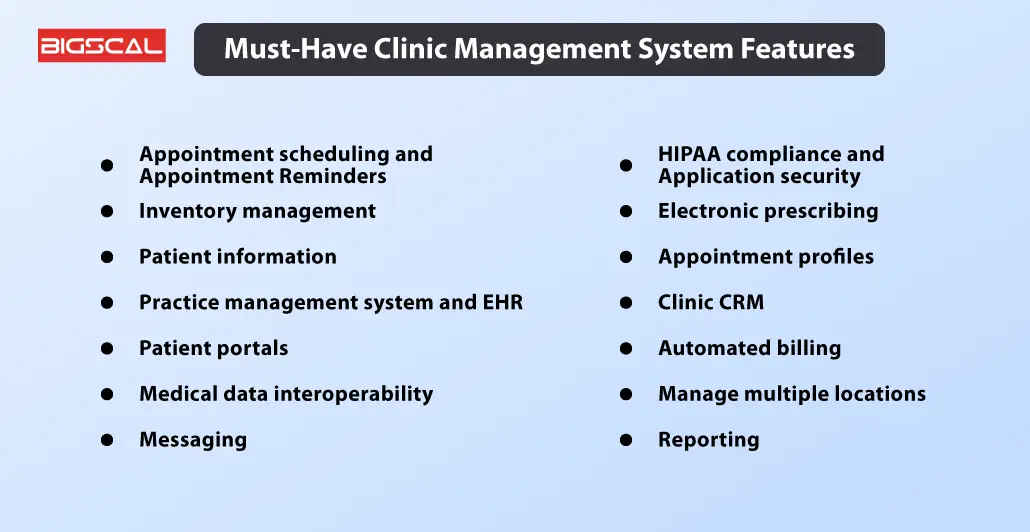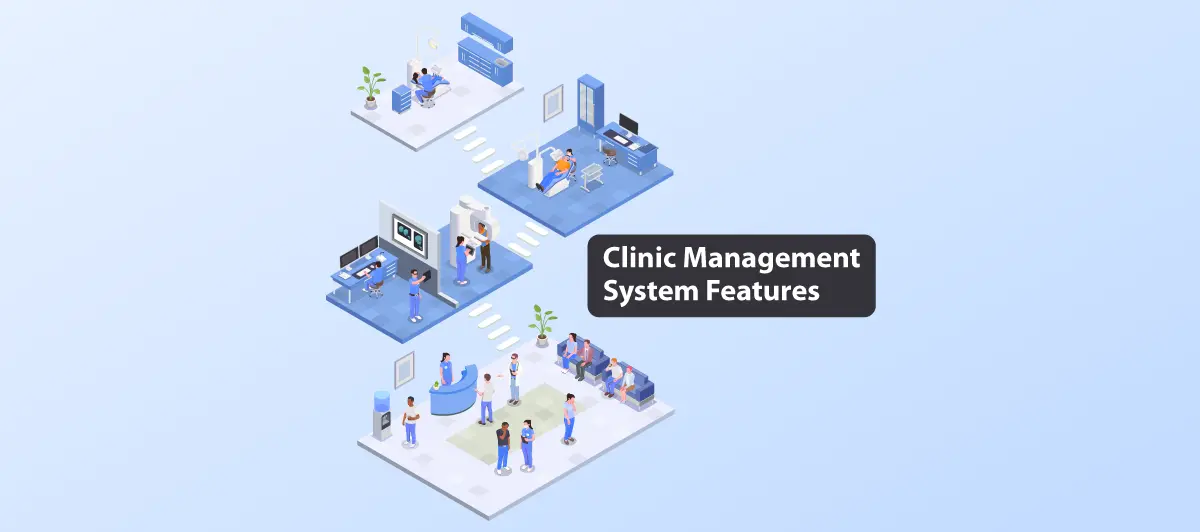10 Must-Have Clinic Management System Features For Better Workflow
Quick Summary: Upgradation is a must to increase your office efficiency, continuously. Even if you have an online clinic practice management software makes a system, it’s useless without these must-have features; these Clinic Management System features are the key to efficiency for clinical practices. So, read this article and increase your staff productivity with these must-have features.
Introduction
We all know about the importance of CMS in many medical practices, but without Must-Have dental clinic management system Features it is not worth it. Thus, you need to integrate all the mandatory features to get maximum outcomes. By integrating features, you can ensure a seamless workflow and efficient patient care.
You are now having questions like the exact reason to integrate innovative features, how it would benefit medical practice, and what must-have practice management software features are.
So, from appointment scheduling to prescription management tools and automated medical billing, and invoicing, there are more features you need to know. And all the remaining features you will read in this article. Furthermore, you will also get answers to all your questions.
Keep reading and get insights about how these features can enhance your clinic management system project!
What is Clinic Management System Software?

Before diving into the digital Clinic Management System Features, let’s first take a quick overview of Clinic Management System Software. A Clinic Management System Software is a tool that helps healthcare providers manage clinics, organize and streamline their daily operations.
Essentially, it assists clinics in managing various administrative and operational aspects out of their workflow efficiently, making it easier to provide quality healthcare services. A Clinic Management System (CMS) software is a tool designed to streamline and organize the operations of a medical clinic or healthcare facility.
It is a digital platform to manage electronic health records, patient information, appointments, billing, and other administrative tasks. In a nutshell, it is like a virtual assistant for healthcare providers. It helps schedule patient appointments, track medical records, and handle billing and payments. The scope of the clinic management system is vast. This system enhances efficiency by reducing manual paperwork, and minimizing manual errors.
Why Do You Need To Implement Clinic Practice Management software?

Before anything, to know the reason for implementing clinical/medical practice management software services is important. So, this software serves as a centralized system to manage various aspects of medical practice software a clinic efficiently. Or clinic appointment management system. It helps in appointment scheduling, simplifying billing processes, and maintaining patient records securely.
With such software, appointment scheduling becomes organized, reducing the likelihood of errors and overlapping appointments. The billing process is automated, ensuring accurate invoicing and timely payments. Patient records and medical software are digitized, making routine tasks of accessing and updating medical information easy, leading to better patient care.
Moreover, Practice Management software and open source clinic management system enhances communication among staff members, facilitating collaboration and improving healthcare practice and overall workflow. It also enables better compliance with regulatory requirements, ensuring that the clinic operates within legal and ethical standards.
Must-Have Clinic Management System Features
Let’s have a look at hospital clinic management system Features:

Appointment scheduling and Appointment Reminders
The features of performance management the practice should include are Appointment scheduling and Appointment Reminder. We should strive toward making the whole process of finding a convenient appointment time as straightforward as possible by allowing them to schedule the appointment easily. Similarly, this option is critical for hastening patients’ flow within the facility and decreasing the waiting time.
Through complementing these components, medical specialists would be able to allow patients to book their appointments through his CMD. On the contrary, the CMS practices are most likely utilizing the built-in appointment reminders and reminder features in order to limit no-shows. Automatic reminders in SMS or e-mails for physicians and patients always ensure that their appointments won’t be overlooked or sleeping out time.
Inventory management
Inventory management is the most temporary function undertaken in the clinical set-up to monitor and control its consumables. The CMS includes stock management tools that save companies from spending on special clinic inventory management system The functionality of this feature makes it possible for healthcare providers to monitor the operating cycle of medical equipment such as bed sheets, syringes, and medication.
It prevents shortages or overstock situations and helps the service run smoothly. It therefore helps healthcare services to achieve their best potential. The hospital staff will be informed about patient status and stock level in real-time via this web-based platform, thereby allowing for proper supply management and usage decisions. Proper inventory management is one of the drivers that also helps to cut costs in company operations, as it reduces waste and guarantees that the much-needed stuff is available when a demand arises
Patient information
Unlike other features, patient information management is the core element in a clinic management system. This aspect encompasses keeping data inclusive of a patient’s demographics, point of contacts, medical details like his history, and insurance information in the correct order.
Such an e-track of health record allows fast retrieval of all the necessary data for healthcare providers and consequently keeps treated person’s care procedure more efficient. Through it, correct registration records are kept, appointments are tracked, and the team members can communicate well.
Practice management system and EHR
Introducing Practice Management System (PMS) and Electronic Health Records (EHR) should be a necessary step to manage procedures in healthcare operations. With that, PMS arranges administrative work such as scheduling appointments, billing, and inventory that is expected from the right practice management software. On the plus side, HER converts and gathers patients records digitally and peripherizes them to all healthcare specialists across the board, thus sharing maximums of information safely.
The multifunctional practice management system allows for whole clinic effectiveness enhancement, management of paperwork, reduction of errors, and ultimately improvement in the quality of patient care by incorporating all of the information that is required, whether it is a patient’s medical history or treatment plan. coordinating these systems play a crucial role in the working of modern and ordered health care services.
Patient portals
A patient portal is a fundamental part of a health management system providing a secure online platform for particular individuals who can then read their own health information easily. It provides patients to screen their test results, makes arrangements for their appointments and be in contact with healthcare providers.
With coming closer, the patient engagement is also getting facilitated and the users are getting the chance to join the care journey as the real actors more than never before. Patient portal is a piece that is a part of the much transparent and involved healthcare environment that will help the patients and the health caregivers to communicate and be on the same page.
Medical data interoperability
The ability of systems or platforms to exchange data in the electronic field and using it, is called the interoperability of medical data. In any clinic management system, the term interoperability means that the patient data is shared among healthcare providers, labs, and other relevant entities in a smooth and timely manner.
This feature is the fundamental of well-integrated care as it ensures the prevention of data windows and helps increase healthcare performance in general. This makes it possible for healthcare specialists to catch up with a patient’ medical history giving way to decisions that are more evidence-based which further results in improved levels of care.
Interoperability plays a vital role in building a real time communication Highway which would help data transfer and translation smoothly for better patient care.
Messaging
Messaging functionality is essential in a Clinic Management System (CMS) or web based clinic management system. This allows seamless communication between healthcare providers, staff, and even patients. Messaging simplifies coordination, appointment scheduling, and sharing important updates.
Moreover, it enhances efficiency, ensuring quick exchanges of information within the healthcare team, leading to improved patient care.
HIPAA compliance and Application security
HIPAA (Health Insurance Portability and Accountability Act) compliance is paramount for any CMS. It ensures that patient data is handled securely, maintaining privacy and confidentiality. The application must adhere to strict security measures to protect sensitive information.
This includes encryption, access controls, and regular security audits. Robust application security safeguards patient data and builds trust among healthcare professionals and patients, making the CMS a reliable and secure tool for managing health records and facilitating quality healthcare services.
Electronic prescribing
Electronic prescribing is a feature in a clinic management system design (CMS) that digitizes the prescription process. Instead of traditional paper prescriptions, doctors can create and send electronic prescriptions directly to pharmacies.
This feature improves accuracy, reduces the risk of errors, and enhances overall efficiency. Doctors can easily access patients’ medication history, check for potential interactions, and send prescriptions directly to pharmacies, streamlining the entire prescription workflow.
Patients benefit from faster and more accurate prescription fulfillment, promoting better adherence to prescribed medications and ultimately improving healthcare outcomes.
Appointment profiles
Appointment profiles are essential components of a Clinic Management System that streamline the scheduling and management of patient appointments. This feature allows healthcare providers to create, view, and manage appointments for individual patients.
It provides a centralized platform to schedule appointments, set reminders missed appointments, and track patient visit history. By using patient scheduling and maintaining detailed appointment profiles, clinics can optimize their scheduling processes, reduce wait times, and enhance patient experience.
This feature also facilitates efficient resource allocation, enabling clinics to effectively manage their staff and facilities. Appointment profiles contribute to a more organized and patient-centric approach to healthcare delivery.
Clinic CRM
A Clinic Customer Relationship Management (CRM) system is essential for maintaining patient relationships and better clinical care. It organizes patient data, appointments, and communication, ensuring a personalized and efficient healthcare experience.
A user-friendly interface allows doctors and staff to access patient histories, track appointments, and send reminders. This feature streamlines communication, enabling better patient engagement and satisfaction.
Automated billing
Automated billing in a Clinic Management System eliminates the hassle of manual invoicing and payment processing. This feature automated patient check in the billing cycle, generating accurate invoices based on services provided and treatment plans.
It provides timely and error-free billing, reducing the risk of financial discrepancies. Automation also expedites payment collection, improving cash flow for the clinic. Additionally, it allows for easy tracking of payments and outstanding balances, facilitating efficient financial management.
Manage multiple locations
A CMS with the capability to manage multiple locations ensures seamless coordination across various branches or facilities. This feature allows healthcare administrators to oversee and control operations efficiently, whether it’s a network of clinics or satellite offices. It simplifies the task of handling patient records, appointments, and resource allocation across different locations.
This functionality is important for maintaining a centralized system that simplifies administrative tasks. It enhances communication, and ensures consistency in patient care, irrespective of the clinic’s physical location.
Reporting
Reporting is crucial to any clinic management system, offering insights that facilitate informed decision-making. This feature involves generating reports on various aspects of clinic operations, such as patient demographics, appointment scheduling, billing, and resource utilization.
This reporting feature provides the administration with valuable data. This enables doctors to assess the valuable data-driven decisions. From financial analysis to evaluating staff productivity, reporting features contributes to overall efficiency and strategic planning of the healthcare facility.
How Bigscal Can Help In Integrating Key Clinic Management System Features?
If you want to integrate such Clinic Management System Features. Don’t have an idea how to create clinic management system? And are searching for a software development company to integrate customized features as per your choice, then you must approach us.
Our developers are pro at integration of customized features. This will help you to optimize seamless healthcare delivery. With a focus on real-time accessibility, We ensure connectivity for on-call consultation services. Our Expertise lies in establishing a secure telehealth infrastructure. Further we implement end-to-end encryption for patient information protection during virtual consultations.
Additionally, our approach to clinic management software development encompasses user-friendly interfaces and innovative or latest features. These features allow healthcare providers to deliver virtual services effectively while prioritizing patient confidentiality and convenience. With us, the seamless integration of all must-have Clinic Management System features will ensure a technologically advanced and patient-centric approach to healthcare management system
Conclusion
Now that you know all about these 10 Must-Have Clinic Management System Features. And along with that, you also learn about the benefits of implementing these features. From seamless appointment scheduling to streamlined record-keeping, these features empower clinics to provide better patient care. So, why settle for less? Harness these features now and make your clinical workflow more smoother.
FAQ
What is clinic management system in ASP.Net?
A clinic management system in ASP.Net is a web-based application developed using the ASP.Net framework. It facilitates efficient clinic operations management, including appointment scheduling, patient records, billing, and staff coordination. ASP.Net provides a robust platform for creating dynamic and scalable solutions, enhancing the overall functionality of the clinic management system.
What is cloud based clinic solution and system?
Cloud based software-based clinic solutions and systems refer to a healthcare management platform hosted on the cloud. It enables clinics to store and access patient data, manage appointments, and streamline operations online. This scalable and accessible approach enhances collaboration among healthcare providers and ensures data security through remote servers.
What is the aim of the clinic management system?
A clinic management system aims to streamline and enhance the overall efficiency of healthcare operations. It focuses on automating administrative tasks, optimizing appointment scheduling, maintaining accurate patient records, and facilitating better communication among staff. The ultimate goal is to improve patient care delivery and create a more organized healthcare environment.
What are the functions of a clinic?
Clinics serve various functions, including medical consultations, diagnosis, treatment, and preventive care. They handle routine check-ups, vaccinations, and manage chronic conditions. Clinics also provide health education, promote wellness, and offer specialized dental care or reproductive clinical management behavioral health services. Overall, their functions aim to have health care organizations ensure community health and well-being.
What is a feature of practice management software?
A key feature of practice management software is appointment scheduling and tracking. This functionality allows healthcare providers to manage patient appointments efficiently, reducing scheduling conflicts and optimizing daily clinical workflows. These systems often include billing, electronic health record management, and reporting features to enhance overall practice efficiency.







